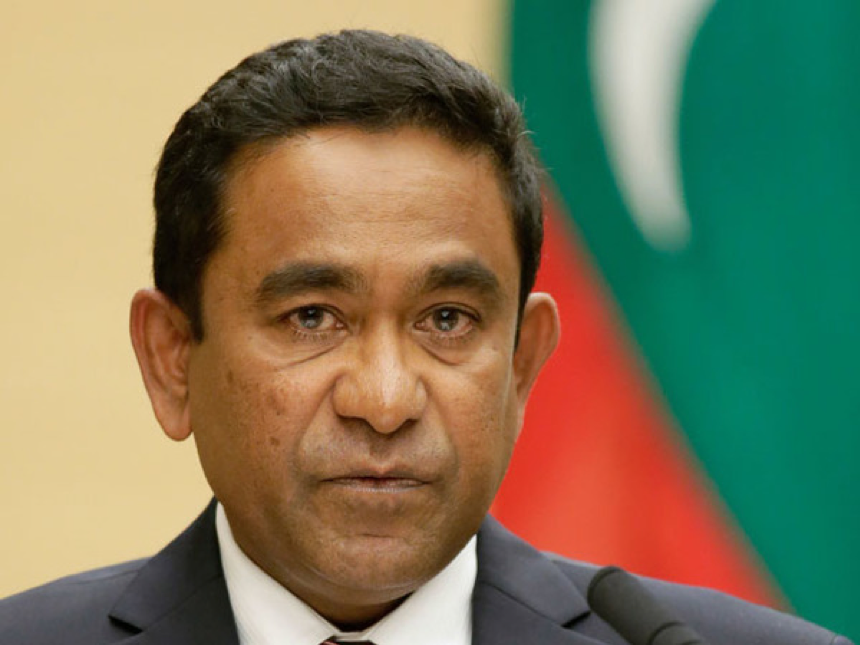Water Wars: Conflict in the Maldives Between Major Powers
India and China React to the Maldives’ Constitutional Crisis
India and China have become entangled in a constitutional crisis in the Maldives, with both countries brandishing their navies while attempting to come to a diplomatic solution.

Published by The Lawfare Institute
in Cooperation With

India and China React to the Maldives’ Constitutional Crisis
India and China have become entangled in a constitutional crisis in the Maldives, with both countries brandishing their navies while attempting to come to a diplomatic solution.
The crisis began on Feb. 1 when the Maldives Supreme Court ordered the release of all political prisoners, citing violations of due process in their trials. The released prisoners included multiple members of the opposition Maldivian Democratic Party (MDP), and the order also covered former president Mohamad Nasheed, who was sentenced to 13 years in prison in 2015 but is now living in exile in London. In response to this ruling, President Abdulla Yameen declared a state of emergency, arresting members of the Supreme Court, dispatching police to keep order, and suspending parts of the constitution. However, the Maldives government has stated it does not intend to extent the state of emergency past March 22. The Maldives are scheduled to hold presidential elections this summer.
The crisis has international implications because both India and China have interests in the islands. Though the Maldives had traditionally had a close relationship with India, in recent years the island-state has pushed aside Indian projects in favor of Chinese investment, including cancelling a $500 million contract for an Indian consortium to build an international airport. Chinese tourists now make up the largest portion of visitors to the islands, and in December 2017—two months prior to the State of Emergency—the Maldives signed a free trade agreement with China as part of the “21st Century Maritime Silk Road” project under the Belt and Road Initiative. Notably, the Maldive Parliament’s approval of the free trade agreement occurred in an emergency session with no members of the opposition party present, drawing condemnation from the absent members.
So far, India has chosen not to intervene directly in the crisis, instead expressing its displeasure at the president’s actions and attempting to come to a diplomatic resolution, despite a request from former president Nasheed to intervene militarily against the current government. The Maldives government has told India to stay out of their “internal matter,” citing its own lack of interference in the Kashmir question. Meanwhile, China requested that the international community “play a constructive role on the basis of respecting the sovereignty of the Maldives,” and stay out of what it termed the Maldives “internal affairs.”
India’s policies are not without a show of force. Immediately following the state of emergency declaration, the government deployed transport planes to a position of readiness and ordered paratroopers to remain on standby. It also launched a large-scale tri-service military exercise, “Paschim Lehar” on Feb. 12, which included warships, submarines and an aircraft carrier.
In turn, on Feb. 20 a fleet of Chinese warships, including multiple destroyers and a frigate, entered the Indian Ocean for the first time in four years. China claimed its entrance into the Ocean was unrelated to the crisis, telling Reuters the warships were engaged in “normal exercises for this year ... not aimed at any third party.” Though China’s intervention was over 2,500 nautical miles from the Maldives and the Chinese warships quickly returned to the South China Sea, the naval deployment led to some consternation in the Indian media.
Some outside experts have argued that China’s incursion into the Indian Ocean is the reason India has chosen not to intervene militarily. However, diplomacy continues between the parties, with Indian Foreign Secretary Vijay Gokhale visiting China at the end of February to conduct bilateral talks on multiple issues, including the Maldives, though the precise details of what they discussed remain unclear.
With the state of emergency set to expire on March 22 after 45 days, none of the parties involved seem ready to take decisive action, but by no means has the crisis been resolved.
USS Carl Vinson Calls in Vietnamese Port in Historic Visit
The USS Carl Vinson, a U.S. nuclear-powered supercarrier, made a historic port visit to Vietnam on March 5. The visit is the first made by a U.S. warship of its size since the end of the Vietnam War in 1975. The five-day visit to Danang, where U.S. combat troops first landed in Vietnam several decades ago, is highly symbolic of the growing cooperation and ties between the former adversaries in defense and military matters.
Speaking about the trip, Vice Adm. Phillip Sawyer, commander of the U.S. Seventh Fleet, noted that the American presence was about the “relationship with Vietnam, both from a military relationship and from a comprehensive partnership relationship.” He also said the militarization in the South China Sea and China’s land reclamation were causing “angst” in the region, in part due to lack of transparency. The Vinson’s visit is part of a growing U.S. commitment to expanding its naval presence in the region through freedom of navigation operations (FONOPs) and other maritime deployments. After its Vietnam visit, the Vinson conducted anti-submarine warfare drills with the Japanese Maritime Self Defense Force.
Chinese Foreign Minister Wang Yi, speaking at a press conference during the National People’s Congress in Beijing, said, “sending a fully armed vessel and aircraft to show off [U.S.] military powers in the South China Sea has become the greatest disturbance to the peace and stability in the South China Sea.” Chinese publications have echoed the criticism, with the People’s Daily claiming that the United States “is free to send warships to the South China Sea” but that it would “only waste money.” The paper also stressed that Vietnam is developing ties with both the United States and China.
Rising ties between Vietnam and the United States stand in contrast to the actions of other countries, like the Philippines, which have been moving closer to Beijing in recent years. Vietnam also claims areas within the South China Sea and is engaged in land reclamation and construction activities to buttress its claims against Chinese activity. In recent years, Vietnam has been strengthening its ties with India, Japan, Australia and the United States—the members of the Quadrilateral Security Dialogue. Vietnamese trade with the United States has doubled in the last five years, and the United States lifted a decades-old arms embargo in 2016. Vietnam is a signatory to the recently-agreed Comprehensive and Progressive Agreement for Trans-Pacific Partnership (TPP), which will deepen regional trade between 11 countries around the Pacific despite the United States’ withdrawal last year.
In Other News …
In the United States
By unanimous consent, Congress has passed the Taiwan Travel Act, a bill aimed at increasing ties between Taiwan and the United States by encouraging officials from both countries to more-easily meet with the governments of the other. China has opposed the passage of the act, with An Fengshan of the State Council’s Taiwan Affairs Office saying it “seriously violates the One-China principle.” The final bill is now awaiting President Trump’s signature, though the White House has not publicly commented on whether it will sign.
Though the bill would be non-binding, it could prove highly significant because it will give the administration cover to conduct more high-level contacts with the Taiwan government and encourage U.S. agencies to work more closely with their Taiwanese counterparts. The U.S. has historically avoided sending high-level officials to Taiwan in order to avoid angering China.
The Trump administration seems to have little interest in placating China. Various news agencies have reported that the administration is considering investment restrictions and visa restrictions on Chinese travelers, as well as tariffs on up to $60 billion of Chinese imports, especially in the technology and telecommunication sectors. These tariffs seem to be motivated in part by a desire to punish China for what the U.S. views as unfair intellectual property practices, including forcing American companies to share trade secrets as the price of doing business in China. However, due to the large volume of commerce between the two countries, many U.S. companies such as Boeing could be hurt by potential retaliation by Beijing.
In the Philippines
The Philippines is exploring oil and gas development in its maritime claims through partnerships with Chinese entities. Proposed areas are located within the Philippines’ claimed exclusive economic zone (EEZ), though some are disputed between the Philippines and China. The Philippine government has previously acknowledged that any energy deal should be agreed with Chinese corporations, rather than the Chinese government, in part because of the complexity of issues over sovereignty.
However, a Philippine judge ruled last week that any exploration deal with Chinese corporations would be illegal unless China also acknowledges Philippine sovereignty over its EEZ. The judge, Antonio Carpio, is the top judge of the nation’s Supreme Court, and previously supported the legal team in the Philippines’ challenge against China at the Permanent Court of Arbitration. Carpio noted that the Philippine constitution “says the state shall protect its marine wealth in its exclusive economic zone,” and that the 2016 arbitration ruling against China supported those sovereign rights.
Since the 2016 arbitration win against China, the Philippines has taken a softer position with regard to its maritime claims. President Duterte has argued that China’s militarization of the Spratly Islands is not directed at regional powers such as the Philippines, but instead at the United States. His administration has also deepened economic and military ties with China in recent years.
Analysis and Commentary
There has been a great deal of commentary on the proposed removal of the two-term limit on the Chinese presidency, which cements President Xi’s seat atop the Chinese political establishment. Writing in Bloomberg, Hal Brands considers how Xi’s authority within China will influence its Asian neighbors, perhaps pushing them deeper into security cooperation with other regional players such as the United States and Japan. Bloomberg’s James Stavridis notes that the consolidation of power will increase China’s influence and competition with the United States, but highlights the risks of one-man rule. Oh Ei Sun of the South China Morning Post argues that the term-limit change signals Xi’s aggressive posture in the South China Sea is here to stay.
In The Diplomat, Prashanth Parameswaran discusses Malaysia’s possible renaming of the South China Sea as a subtle way of hardening its position and underscore its claims against China’s recent activity.
What did China intend by sending warships into the Indian Ocean on Feb. 20? At Livemint, Abhijit Singh and Abhijnan Rej argue that the deployment was meant to pressure India against intervening in the Maldives, calling it a “game of chicken.” At The Diplomat, Ankit Panda expresses skepticism of this thesis, noting attempts by Chinese media to downplay the deployment’s importance.



.jpg?sfvrsn=407c2736_6)


